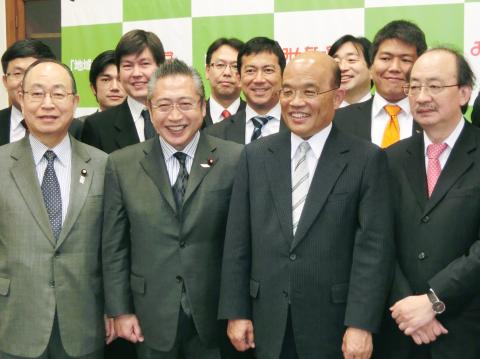The Democratic Progressive Party (DPP) yesterday rejected Beijing’s criticism of the party’s “flattery of Japan” over the Diaoyutai Islands (釣魚台) dispute, saying that China’s provocative moves in the region are what should be condemned.
China’s Taiwan Affairs Office spokesman Fan Liqing (范麗青) on Tuesday said DPP Chairman Su Tseng-chang (蘇貞昌), who is scheduled to return to Taiwan today after a five-day visit to Tokyo, displayed “a lack of national pride” with his “flattery” of Japan on the territorial issue.
“The DPP has its own views and assessment about Taiwan’s national strategic interests. While Taiwan and Japan both claim sovereignty [over the Diaoyutais], they also share the common interests of maintaining peace and stability in East Asia,” Su said in Japan.

Photo: Lee Hsin-fang, Taipei Times
“The most urgent task at hand is how to secure fishing rights in the region, where Taiwanese have been fishing for hundreds of years,” Su added.
Su and the DPP delegation visited the ruling Liberal Democratic Party’s (LDP) think tank yesterday.
The DPP chairman urged both sides to resolve the issue of fishing rights in waters near the Diaoyutais as soon as possible through peaceful dialogue and again highlighted the friendship between people in the two countries.
DPP headquarters offered a more straightforward counterattack to China’s criticsm, with spokesperson Lin Chun-hsien (林俊憲) saying that the DPP has always called for resolving the dispute through bilateral negotiations and that the party “opposes China’s intentional provocation in waters around the Diaoyutais, which are known as the Senkakus in Japan.”
Beijing’s provocation has created tension and instability in the region, he said, adding that Taiwanese would not accept Beijing’s attack on the DPP.
China has no grounds to comment on Taiwan’s affairs when it oppresses Taiwan’s international space, threatens to take Taiwan by military force and has more than 1,000 ballistic missile aimed at Taiwan, Lin said.

Alain Robert, known as the "French Spider-Man," praised Alex Honnold as exceptionally well-prepared after the US climber completed a free solo ascent of Taipei 101 yesterday. Robert said Honnold's ascent of the 508m-tall skyscraper in just more than one-and-a-half hours without using safety ropes or equipment was a remarkable achievement. "This is my life," he said in an interview conducted in French, adding that he liked the feeling of being "on the edge of danger." The 63-year-old Frenchman climbed Taipei 101 using ropes in December 2004, taking about four hours to reach the top. On a one-to-10 scale of difficulty, Robert said Taipei 101

Nipah virus infection is to be officially listed as a category 5 notifiable infectious disease in Taiwan in March, while clinical treatment guidelines are being formulated, the Centers for Disease Control (CDC) said yesterday. With Nipah infections being reported in other countries and considering its relatively high fatality rate, the centers on Jan. 16 announced that it would be listed as a notifiable infectious disease to bolster the nation’s systematic early warning system and increase public awareness, the CDC said. Bangladesh reported four fatal cases last year in separate districts, with three linked to raw date palm sap consumption, CDC Epidemic Intelligence

Taiwanese and US defense groups are collaborating to introduce deployable, semi-autonomous manufacturing systems for drones and components in a boost to the nation’s supply chain resilience. Taiwan’s G-Tech Optroelectronics Corp subsidiary GTOC and the US’ Aerkomm Inc on Friday announced an agreement with fellow US-based Firestorm Lab to adopt the latter’s xCell, a technology featuring 3D printers fitted in 6.1m container units. The systems enable aerial platforms and parts to be produced in high volumes from dispersed nodes capable of rapid redeployment, to minimize the risk of enemy strikes and to meet field requirements, they said. Firestorm chief technology officer Ian Muceus said

MORE FALL: An investigation into one of Xi’s key cronies, part of a broader ‘anti-corruption’ drive, indicates that he might have a deep distrust in the military, an expert said China’s latest military purge underscores systemic risks in its shift from collective leadership to sole rule under Chinese President Xi Jinping (習近平), and could disrupt its chain of command and military capabilities, a national security official said yesterday. If decisionmaking within the Chinese Communist Party has become “irrational” under one-man rule, the Taiwan Strait and the regional situation must be approached with extreme caution, given unforeseen risks, they added. The anonymous official made the remarks as China’s Central Military Commission Vice Chairman Zhang Youxia (張又俠) and Joint Staff Department Chief of Staff Liu Zhenli (劉振立) were reportedly being investigated for suspected “serious